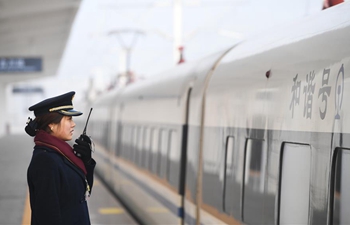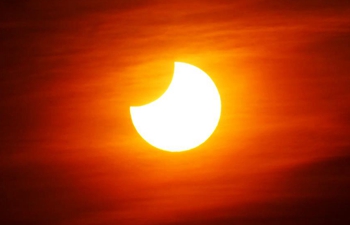
A day laborer has his breakfast while waiting for employers in San Diego, the United States, Jan. 5, 2019. Statistics show that the so-called "illegal immigrants" have contributed a lot to the U.S. economy. A cross-section of Californian leaders in business, education, law enforcement and religion testified at the Supreme Court of the United States in 2016 that a quarter of illegal immigrants in the country lived in California, which accounted for 7 percent of the Californian population. (Xinhua/Li Ying)
by Huang Heng, Tan Yixiao
SAN DIEGO, Jan. 7 (Xinhua) -- "What Congress and Trump do is all politics; what we are here to speak about is people's lives. They're playing games with each other and not caring about us," Juan, a 34-year-old alien day laborer who refused to reveal his last name, told Xinhua.
Just past 9 a.m. on a cloudy Saturday, Juan and dozens of other day laborers stood at a corner of the parking lot of a Home Depot on Fairmount Avenue, awaiting their work.
Like usual, cars and pickups came by. Drivers discussed prices with these men from Mexico, Guatemala and Haiti. Some of them then got into the trucks and left, while more would go afterwards to the underground labor market, trying their luck.
No employer asked these alien laborers for immigration documents there, but thousands of kilometers away, in Washington, controversy on immigration and the building of a border wall that would be located just 35 km south of the Home Depot has led to the U.S. government shutdown for weeks.
DAILY NEED
They are called day laborers as they always ask to be paid daily, whether their amount of work is calculated by the hour or project.
"Sometimes, after a 200-U.S. dollar job, they (employers) will say 'I don't have the money with me, follow me to the bank,' and when they're following them to the bank, all of a sudden the car takes off and they get away. So they robbed them, they really robbed them," Enrique Morones, founder of Border Angels, explained to Xinhua as to why the laborers require daily payment.
On the other hand, these laborers satisfy the daily needs of local people, said Morones, who is also head of the San Diego-based volunteer group aiming at helping migrants.
"There is a lot of different types of jobs like hanging drywall, gardening and construction. Right now there are about 15 of them (day laborers) working on a demolition project," Morones said. "Even if the Home Depot is closed, there are still people who come by knowing ... and try to hire somebody."
Juan said local people want to hire day laborers so as to save money. "The agencies are going to charge them 45 dollars an hour, but here around 15 dollars an hour," he added.
Cladio, a 55-year-old day laborer from Mexico, told Xinhua he used to be hired to work as far away as Riverside and San Bernardino, more than 200 km away from the border.
"There are two things, one is (that it's) less expensive and two (is) they are very hard workers. They'll do a lot more work than somebody else," Cladio said. "You don't see the Latinos on corners asking for money. They're actually here to work."
Statistics show that the so-called "illegal immigrants" have contributed a lot to the U.S. economy.
A cross-section of Californian leaders in business, education, law enforcement and religion testified at the Supreme Court of the United States in 2016 that a quarter of illegal immigrants in the country lived in California, which accounted for 7 percent of the Californian population.
Meanwhile, more than 34 percent of agriculture laborers, 22 percent of manufacturing laborers and 21 percent of construction workers in the Golden State were illegal immigrants.
"The undocumented workforce alone made over 130 billion dollars' GDP for California last year, which was more than the entire respective GDPs of 19 other states," they said in a court brief.
NATIONAL SECURITY?
However, since his presidential campaign, U.S. President Donald Trump has been preaching building a border wall between the country and Mexico to keep out rapists, criminals and drug traffickers, though in reality most migrants are simply looking for work.
"The overwhelming majority of the people here are good people. They're here to work trying to support their family. And like everywhere in the world, there are some criminals, but that doesn't have anything to do with whether you're documented or not," Cladio said.
"Most of the migrants are not criminals. They're the opposite. They're trying to do something for their family. That's why they're risking their life crossing the border and coming over here," he added.
Tina Better, a 55-year-old preschool teacher who has been working for Border Angels for five years, also doubted the border wall's efficiency against crime.
"I understand where they might be coming from, but it's really not going to stop the bad people and the drug trade. All those people, they're going to get in here whether there's a wall or not ... It's just a sad thing to put up a wall like that," she said.
"I don't think it's necessary for security. I think it's a waste of money. That money could be used for plenty of other things," said Better, adding that there has been plenty of border patrol and security technology.
Furthermore, she is afraid the proposed wall would trigger more moral crisis.
"I just don't think the wall will keep out drugs and stuff. I think it's more keeping out the good people that are trying to come. Keeping them out will also force them to go into the desert areas, even in the cold in the wintertime or in the high heat in the summertime, which sometimes is deadly for them."
Border Angels, which has water drops in the desert every third Saturday of the month, said that since Operation Gatekeeper started in September 1994, about 10,000 people have lost their lives trying to cross into the United States from Mexico due to extreme weather, lack of food and water, and the overall perilous nature of the trip.
Operation Gatekeeper was a measure implemented during the presidency of Bill Clinton by the United States Border Patrol, which aimed to halt illegal immigration to the country at the U.S.-Mexico border near San Diego, California.
POLITICAL GAME
"It's an unnecessary cost and a waste of money. They should look at other ways for immigration, not the wall," echoed Morones, who founded Border Angels in 1986. "As a matter of fact, this country is predominantly made of immigrants. Look at Trump. His wife is an immigrant. He had undocumented people working for him."
Morones pointed out that the country should take responsibility for these people who are seeking a better life, basic sustenance for their familyor freedom from poverty and violence which are "not only the result of the various countries' government, but also that of U.S. economic and political involvements in Latin America."
Both Morones and Better agreed that a partial government shutdown, the result of a budget standoff between the White House and Democrats over funding for Trump's controversial border wall, is ridiculous.
The shutdown, on its 15th day by Saturday, has affected nine cabinet-level departments and dozens of agencies, forcing about 420,000 federal employees whose jobs are deemed essential to work without pay, while 380,000 others were asked to take unpaid leave.
Trump said Friday that he is prepared for a partial government shutdown to last for months or years, after his meeting with congressional leaders yielded no deal over funding for the wall.
"It's crazy to have the government shut down over this. They could keep the government open and still negotiate on the wall or border security without closing the government down," Better said "This is harming the average person."
"Nobody knows how long it will last," Morones said. "Trump is like a little child, stubbornand he's not qualified to be president. His stubbornness and what he does is causing a lot of damage. There is a lot of people out of work because of it."
Juan, the Mexican laborer, also had his understanding of the game between the U.S. Congress and Trump.
"It's all politics when it comes to them. That is affecting us and they don't care. They only care what they're going be able to say in the elections," Juan said at the cold parking lot.
However, unlike most of his friends, Juan supported Trump's idea to build the border wall, since he believes the huge construction project will create a lot more working opportunities for day laborers like him.
"More people will come from Mexico to build the wall," he said.











